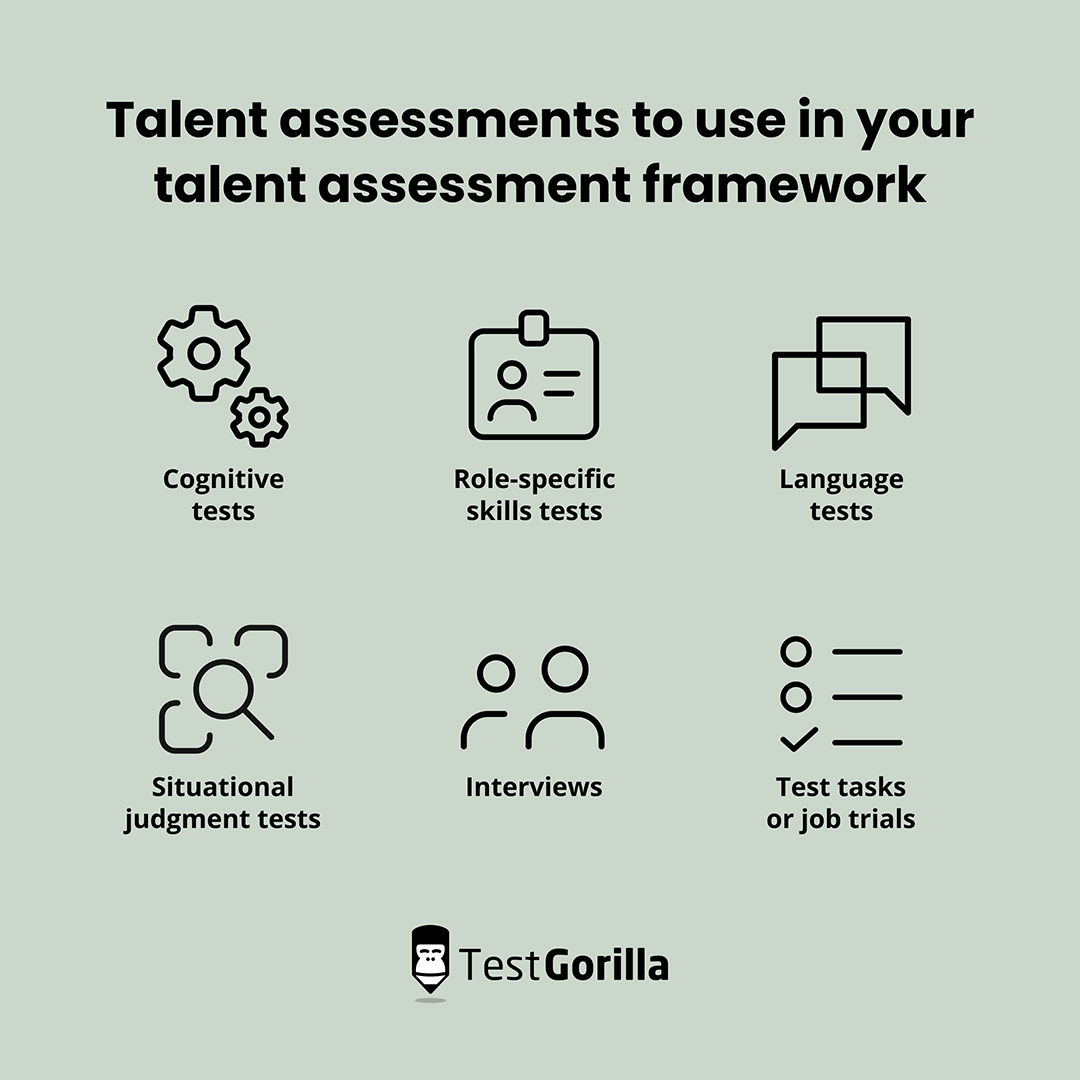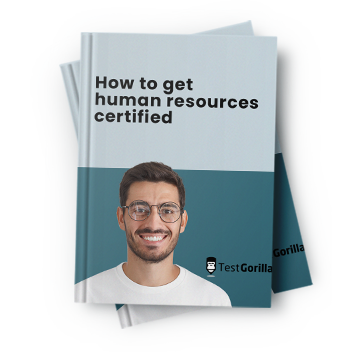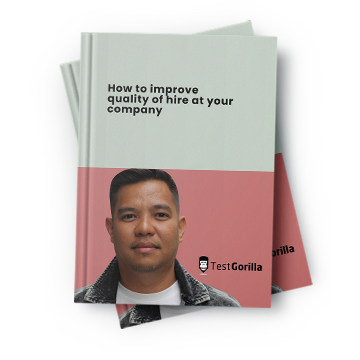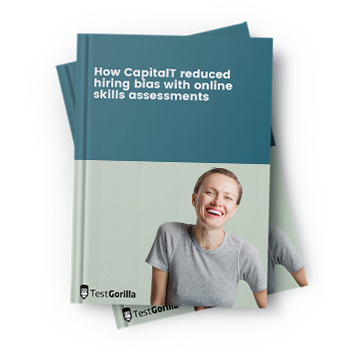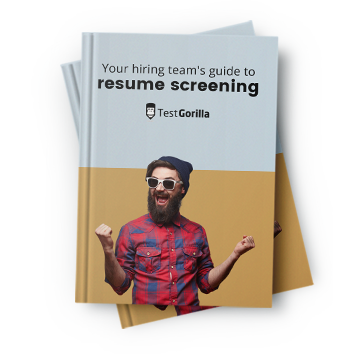One of the main objectives most successful professionals pursue is to be as efficient as possible at their jobs. For someone in a hiring role, this means hiring and retaining the right people for your company while spending as little time and resources as possible on the task.
To do that, you’re going to need more than blind effort and sheer luck. Even your best efforts can turn out to be fruitless if they’re not organized.
Optimizing your hiring process is easy when you implement a talent assessment framework. Talent assessment frameworks allow you to build a hiring strategy that’s aligned with your company culture and gives you the right results.
In this article, we are going to guide you through the steps of building the right talent assessment framework. We are going to explore different types of talent assessment tools and talk about the key skills you need to evaluate to make the best hire.
Table of contents
- What is a talent assessment framework?
- Types of talent assessments you can use in your talent assessment framework
- How to build the right talent assessment framework
- What are the key skills to evaluate during talent assessment?
- Use the right talent assessment framework to build a talent-first organization
What is a talent assessment framework?
A talent assessment framework is the strategy you implement when screening candidates. It essentially covers the entirety of the hiring process – from defining requirements for job roles to assessing your candidates’ skills and, eventually, hiring them and helping them grow within your company.
There are many ways to make use of a talent assessment framework. For example, you could use it to:
Structure upskilling and career development plans
Identify training needs and growth opportunities
Evaluate talent objectively
Make informed decisions about job promotions and job assignments
Enhance performance
There are a variety of methods that can be used for talent assessment.
TestGorilla’s mission is to help you explore the most viable ones and to guide you through the journey of building the right talent assessment framework for your business. We offer science-based standardized talent assessments that provide objective data about your candidates’ and employees’ skills and aptitudes.
Types of talent assessments you can use in your talent assessment framework
Talent assessment frameworks include different types of talent assessments, depending on the job role, team, and project you’re hiring for.
Here is a list of some of the most popular talent assessment tools you can use:
Cognitive tests
Cognitive tests, also known as aptitude tests or cognitive ability tests, are used to evaluate the mental abilities that determine how capable we are of learning, problem-solving, reasoning, thinking critically, and performing other cognitive processes.
Administering the right cognitive tests for the job vacancy you’re looking to fill will help you hire candidates who can adapt quickly to their tasks and learn effectively.
TestGorilla offers a wide range of cognitive ability assessments you can use in hiring or talent mapping.
Role-specific skills tests (including software and programming-skills tests)
Role-specific skills tests cover a vast range of skills for every job role, from marketing manager to bartender to data scientist. They are designed to gauge technical skills that are specifically related to the main duties of the role.
Using these tests to assess skills is more reliable than just reading about them in a person’s resume, especially considering that over half of Americans admit to having lied on their resumes at least once.
To help you streamline hiring and talent management, TestGorilla offers you the following:
Language tests
Measuring language proficiency is a complex process. Language tests have long been used in academic settings to assess a student’s current progress. Nowadays, they’re used in professional settings as well, so people in hiring roles can determine whether their candidates have the right language skills for the job.
If you need to assess applicants’ language skills, head on to our test library, where you can find more than 30 language tests for different proficiency levels and languages – including English, Mandarin, Polish, Spanish, French, and more.
Situational judgment tests
Situational judgment tests show how candidates or employees respond to specific job-related situations. They provide an easy and effective way to validate your candidates’ claims about their abilities, such as “I can keep my cool when I work under pressure”.
Situational judgment tests create an emulation of hypothetical scenarios that candidates are likely to encounter in the job role, such as sound decision making on the spot or handling shifting deadlines.
Use our situational judgment tests to assess skills such as leadership and people management, communication, negotiation, and more.
Interviews
Once you figure out who has the right skills for the role with the help of skills tests, it’s time to invite shortlisted candidates to an interview.
Interviews enable you to get to know your candidates better by asking customized questions. Preparing in advance for conducting interviews is critical.
For the best results, we advise using structured interviews, in which you ask all candidates the same questions in the same order; Google, along with many other top performing companies, use structured interviews in their hiring process.
This enables you to make an unbiased assessment of each person’s strengths and weaknesses. You can still use some personalized questions based on test results at the end of the interview.
Test tasks or job trials
As a part of your recruitment process, you can create a job-related mock task for your candidates to complete, such as providing advice to a customer or demonstrating their typing speed.
Test tasks will vary depending on the job role. For a programming position, it may involve candidates writing code to solve a particular issue, while for a graphic design role, it can mean crafting a design based on a brief.
You can also implement job trials, in which your top candidate attends their prospective workplace for a set amount of time, usually for a day or a few days, to demonstrate their practical abilities.
These assessments provide an even more realistic evaluation of a candidate’s skills and behaviors than a job interview, but might require more resources to implement (and, depending on the role’s onboarding needs, might not always be possible).
How to build the right talent assessment framework
Building the right talent assessment framework can completely transform your business and lead you to new opportunities for growth. The process can be challenging but following these six simple steps will significantly increase your chances to make top hires.
1. Analyze each role
The first step is planning and analysis. Conduct a thorough job analysis to identify and define every job role’s key responsibilities, tasks, and competencies.
For this, ask yourself questions like:
What are the daily tasks that someone in this job role will have to tackle?
What are the long-term business objectives of the role?
How much collaboration with coworkers and other teams is needed?
Make sure you understand each role’s needs, requirements, and complexities.
2. Define the most critical skills
Now that you know what to ask for from your employees, you can make a list of the most critical skills that your candidates need to perform well.
Defining the key skills is the core of building a solid talent assessment framework – and, consecutively, a skills-based organization. Make sure you include hard and soft skills in your selection criteria, as they are equally important for every job role.
3. Assess skills
After you’ve defined the essential skills for the job, it’s time to assess them.
Choosing the right talent assessment tools and templates you’ll be using is a critical step in your hiring process. There are many complex factors you should consider, such as the size of your company, the needs of each project, the particular job vacancy you’re looking to fill, and your company culture.
At TestGorilla, we’re aiming to make this process easier for you. Our mission is to streamline the hiring process and eliminate bias from recruitment.
To start building an objective and fair talent assessment, simply go to our test library where you can find standardized tests for a large variety of skills and aptitudes.
Using a skill-based assessment at the beginning of the hiring process dramatically improves recruitment. This is one of our key conclusions in The State of Skills-Based Hiring 2023 report, for which we interviewed 1500 employers and 1500 employees.
Automating the initial stage of recruiting gives you accurate data that you can use to filter and shortlist candidates and only interview the ones who truly have the right skills to succeed.
After your candidates complete their skills assessments, it’s time to conduct interviews. The interview will provide additional insight into their strengths and weaknesses and help you connect better with your candidates.
Using both skills tests and interviews maximizes your chances of hiring the right candidate for your company.
4. Compare candidates (or employees)
After you’ve finished the process of collecting data, it’s time for evaluation.
Decide how you plan to evaluate assessment results. Are some scores worth more for your business or will you give all the tests an equal weight? It can be useful to make a rating system for every skill and competency so you can compare the results in a more nuanced way.
Skills assessments make this step of the process faster and easier because you get neatly organized reports of your candidates’ results that you can use instantly to compare them.
5. Take action
The final step of building the right talent assessment framework is taking action. This can mean using the information you collected and evaluated to:
Make a hiring decision
Identify areas of improvement for existing employees and build learning and development initiatives to help them grow
Assign projects and tasks
Inform internal promotion planning
6. Analyze results continuously
After you’ve completed these five steps and successfully finalized recruitment or talent mapping, make sure to analyze results continuously and use the data you’ve collected to improve your hiring process and build a more effective talent assessment framework.
Repetition makes perfect and continuous analysis can provide insights that you had previously overlooked.
What are the key skills to evaluate during talent assessment?
Each job role comes with its own skill requirements. There is no specific skill that is essential for any and every job. However, in most instances the key skills that you need to evaluate during talent assessment are a mix of:
Cognitive skills: You can use cognitive ability tests to measure your candidate’s cognitive skills, such as verbal and spatial reasoning or problem solving. Every job role requires using various mental abilities so including cognitive tests in your skills assessment is essential.
Communication skills: Interpersonal skills are important for most job roles. Nearly every position requires interaction with coworkers, clients, superiors, or stakeholders. Being able to communicate clearly and concisely in a professional setting is critical for teamwork and delivering satisfactory results.
Role-specific skills: The best candidate is the one who has a firm grasp of the responsibilities of a role. Role-specific tests will ensure that your candidates have the hard skills it takes to nail each task and that they haven’t inflated their resume.
Personality, culture, and motivation: While those aren’t strictly skills, personality, culture, and motivation play an essential role in ensuring the right job fit. We all have different preferences, behaviors, and interests and these traits make some individuals more suitable for particular roles than others. TestGorilla’s personality assessments will help you evaluate various personality traits, such as extraversion, agreeableness, and motivation.
In addition to the above, we strongly advise you to seek feedback from others when hiring new employees or assessing the skills of your existing workforce.
There are multiple methods to collect such information:
First, you could run a background check on candidates: This helps you ensure that they are being honest with you and can also give you additional information about their past experiences.
You can ask for referrals when you’re hiring: This can give you some knowledge about the individual’s skills and traits in advance. When it comes from experienced and trusted employees, the referral often means the candidate will be well aligned with your company’s values and needs.
Asking for feedback from other employees can be useful as well: Assessing how your employees are seen by their teammates can give you access to important insights that you have no access to otherwise.
Use the right talent assessment framework to build a talent-first organization
Streamlining and structuring talent assessment is the key to making good hiring and talent management decisions. That’s why it’s essential to build the right talent assessment framework to increase your company’s productivity and revenue.
With the help of skills tests, you can assess talent quickly, efficiently, and, most importantly, bias-free.
TestGorilla is here to help. Try our free plan today – or sign up for a 30-minute live demo to see why more than 10,000 companies have chosen TestGorilla to revamp their hiring processes.
Related posts
Hire the best candidates with TestGorilla.
Create pre-employment assessments in minutes to screen candidates, save time, and hire the best talent.
Latest posts
The best advice in pre-employment testing, in your inbox.
No spam. Unsubscribe at any time.

Hire the best. No bias. No stress.
Our screening tests identify the best candidates and make your hiring decisions faster, easier, and bias-free.
Free resources
Anti-cheating checklist
This checklist covers key features you should look for when choosing a skills testing platform
Onboarding checklist
This resource will help you develop an onboarding checklist for new hires.
How to find candidates with strong attention to detail
How to assess your candidates' attention to detail.
How to get HR certified
Learn how to get human resources certified through HRCI or SHRM.
Improve quality of hire
Learn how you can improve the level of talent at your company.
Case study: How CapitalT reduces hiring bias
Learn how CapitalT reduced hiring bias with online skills assessments.
Resume screening guide
Learn how to make the resume process more efficient and more effective.
Important recruitment metrics
Improve your hiring strategy with these 7 critical recruitment metrics.
Case study: How Sukhi reduces shortlisting time
Learn how Sukhi decreased time spent reviewing resumes by 83%!
12 pre-employment testing hacks
Hire more efficiently with these hacks that 99% of recruiters aren't using.
The benefits of diversity
Make a business case for diversity and inclusion initiatives with this data.





